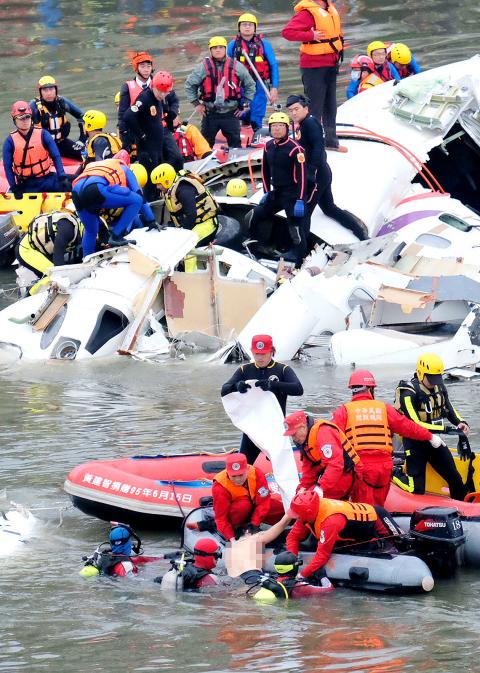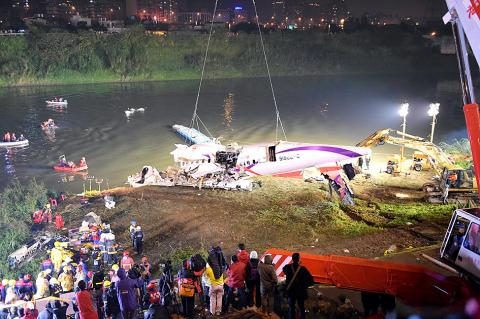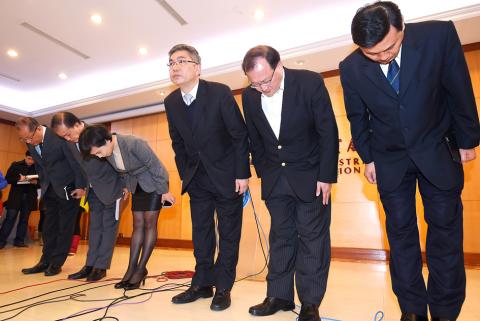A TransAsia Airways (復興航空) airplane flying from Taipei to Kinmen crashed into the Keelung River yesterday, killing at least 25 people, the Civil Aeronautics Administration (CAA) said.
Flight GE235 took off from Taipei International Airport (Songshan airport) at 10:52am, said the agency, which confirmed that it received a “Mayday” signal from the plane’s pilots at 10:53:35am.
Air traffic control personnel tried raising the pilots, but to no avail. Weather data provided by the control tower showed that visibility was 10km when the plane, an ATR 72-600, departed from Songshan airport.

Photo: Sam Yeh, AFP
The weather was quite stable, the CAA said.
The Aviation Safety Council, which is in charge of investigating the cause of the accident, said that it had found the flight data recorder and cockpit voice recorder — also known as the “black boxes” — and would soon start decoding the data.
The data are critical in identifying the cause of the air crash.

Photo: AFP
The plane was carrying 58 people on board: 53 passengers and five cabin crew members.
Thirty-one of the passengers are Chinese tourists, and 27 are Taiwanese. The plane was jointly piloted by 42-year-old Liao Chien-tsung (廖建宗) and 45-year-old Liu Tse-chung (劉自忠), with 4,914 hours and 6,922 hours of flying experience respectively.
Hong Bing-chung (洪炳衷), the copilot, served as an observer during flight as he was training to operate ATR 72-600 aircraft.

Photo: Liao Chen-huei, Taipei Times
Both Liao and Liu are experienced in flying ATR 72-type aircraft, with their flying hours topping 3,400 and 6,500 respectively.
The accident yesterday is TransAsia’s second crash within a year’s time. One of the airline’s ATR 72-500 aircraft crashed on July 23 last year at a village near Magong Airport in Penghu County, killing 48 people and injuring 10 people on board.
TransAsia management bowed and apologized to the victims and their families.
CEO Peter Chen (陳欣德) said that seven of the Taiwanese passengers purchased their tickets at Songshan airport’s check-in counters and only left their ID numbers, adding that the company was still trying to reach the families of the seven passengers.
Ten of the Taiwanese passengers are from Kinmen, he said.
Chen said the Chinese passengers were traveling with the Kaohsiung-based travel agencies Flying Tours (飛揚旅行社) and Sweet Tour (德運旅行社), in cooperation with agencies in Xiamen, China.
TransAsia has asked the travel agencies to help contact the families of the victims, Chen said.
Chen said the company would not speculate on the cause of the air crash, and would fully cooperate with the authorities in the investigation.
The company confirmed that the airplane’s No. 1 engine was replaced with a new one provided by the manufacturer, Pratt & Whitney Canada, when the plane first landed in Macau on its way to Taiwan. The No. 1 engine had only been in operation for 800 hours, the company said.
Chen said the ATR 72-600 aircraft were purchased to replace the company’s ATR 72-500 airplanes as part of its move to upgrade its fleet.
Yu Yi-shi (喻宜式), deputy director of the CAA’s flight standards division, said that Uni Air (立榮航空) has 12 ATR 72-600 planes, while TransAsia has six ATR 72-500s and four ATR 72-600s.
He said that all of the nation’s ATR 72-type airplanes will undergo special inspection in the next two days.
“Because the accident happened with TransAsia’s airplanes, the airline is given one night to complete all the examinations before their aircraft could be cleared to take off on Feb. 5, including engines, propellers. Uni, on the other hand, must finish the same process before Feb. 6,” Yu said.
Information from both the CAA and TransAsia showed that the airline received the aircraft on April 14 last year, with the last maintenance being done on Jan. 26.
Meanwhile, the Environmental Protection Administration (EPA) responded shortly after the crash to address possible fuel leakage.
EPA Department of Environmental Monitoring and Information Management Director-General Chu Yu-chi (朱雨其) said his agency had deployed four survey sites along the section of the river between Nanhu Bridge (南湖大橋) and Minquan Bridge (民權大橋), where the accident took place, to monitor water quality within a 5km stretch along the Keelung River every two hours.
The EPA has also requested help from the Taipei City and New Taipei City governments to deploy two fuel locks under the Rainbow (彩虹橋) and Chengmei (成美橋) bridges to contain possible leakage and driftage, Department of Water Quality senior specialist Wei Wen-yi (魏文儀) said.
Additional reporting by Sean Lin

LONG FLIGHT: The jets would be flown by US pilots, with Taiwanese copilots in the two-seat F-16D variant to help familiarize them with the aircraft, the source said The US is expected to fly 10 Lockheed Martin F-16C/D Block 70/72 jets to Taiwan over the coming months to fulfill a long-awaited order of 66 aircraft, a defense official said yesterday. Word that the first batch of the jets would be delivered soon was welcome news to Taiwan, which has become concerned about delays in the delivery of US arms amid rising military tensions with China. Speaking on condition of anonymity, the official said the initial tranche of the nation’s F-16s are rolling off assembly lines in the US and would be flown under their own power to Taiwan by way

CHIP WAR: The new restrictions are expected to cut off China’s access to Taiwan’s technologies, materials and equipment essential to building AI semiconductors Taiwan has blacklisted Huawei Technologies Co (華為) and Semiconductor Manufacturing International Corp (SMIC, 中芯), dealing another major blow to the two companies spearheading China’s efforts to develop cutting-edge artificial intelligence (AI) chip technologies. The Ministry of Economic Affairs’ International Trade Administration has included Huawei, SMIC and several of their subsidiaries in an update of its so-called strategic high-tech commodities entity list, the latest version on its Web site showed on Saturday. It did not publicly announce the change. Other entities on the list include organizations such as the Taliban and al-Qaeda, as well as companies in China, Iran and elsewhere. Local companies need

CRITICISM: It is generally accepted that the Straits Forum is a CCP ‘united front’ platform, and anyone attending should maintain Taiwan’s dignity, the council said The Mainland Affairs Council (MAC) yesterday said it deeply regrets that former president Ma Ying-jeou (馬英九) echoed the Chinese Communist Party’s (CCP) “one China” principle and “united front” tactics by telling the Straits Forum that Taiwanese yearn for both sides of the Taiwan Strait to move toward “peace” and “integration.” The 17th annual Straits Forum yesterday opened in Xiamen, China, and while the Chinese Nationalist Party’s (KMT) local government heads were absent for the first time in 17 years, Ma attended the forum as “former KMT chairperson” and met with Chinese People’s Political Consultative Conference Chairman Wang Huning (王滬寧). Wang

CROSS-STRAIT: The MAC said it barred the Chinese officials from attending an event, because they failed to provide guarantees that Taiwan would be treated with respect The Mainland Affairs Council (MAC) on Friday night defended its decision to bar Chinese officials and tourism representatives from attending a tourism event in Taipei next month, citing the unsafe conditions for Taiwanese in China. The Taipei International Summer Travel Expo, organized by the Taiwan Tourism Exchange Association, is to run from July 18 to 21. China’s Taiwan Affairs Office spokeswoman Zhu Fenglian (朱鳳蓮) on Friday said that representatives from China’s travel industry were excluded from the expo. The Democratic Progressive Party government is obstructing cross-strait tourism exchange in a vain attempt to ignore the mainstream support for peaceful development